
Planting Seeds
Seeds are important,but it is vital when planting to ensure that not only the seed is good but the soil is good as well. Check back here as we will discuss a variety of thoughts and topics, essentially, planting seeds in our lives that we can help nurture into good fruit.
Mark 4:14-20 The sower sows the word. (15) And these are the ones along the path, where the word is sown: when they hear, Satan immediately comes and takes away the word that is sown in them. (16) And these are the ones sown on rocky ground: the ones who, when they hear the word, immediately receive it with joy. (17) And they have no root in themselves, but endure for a while; then, when tribulation or persecution arises on account of the word, immediately they fall away. (18) And others are the ones sown among thorns. They are those who hear the word, (19) but the cares of the world and the deceitfulness of riches and the desires for other things enter in and choke the word, and it proves unfruitful. (20) But those that were sown on the good soil are the ones who hear the word and accept it and bear fruit, thirtyfold and sixtyfold and a hundredfold."
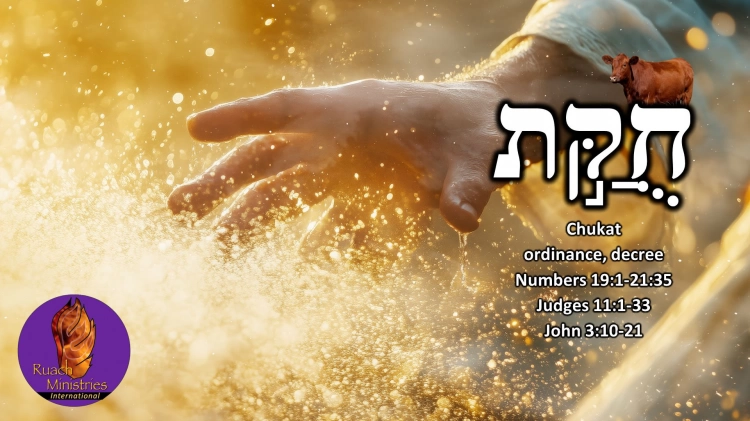
The Red Heifer and Cleansing from Mashiach: Parsha Chukat:
Parsha Chukat (Numbers 19:1-21:35) contains interesting insights through the puzzling ritual of the parah adumah, which is the red heifer. The divine gives us a prophetic insight into Yahweh's future redemptive plan through Yeshua HaMashiach.
The Perfect Sacrifice Foretold
The exact criteria for the red heifer reveals remarkable prophetic information. The heifer needs to be "without defect" (Tamim, complete, perfect) and "no blemish" (mum, no spot or stain) and "upon which no yoke has come." These qualifications powerfully foreshadow Yeshua's perfect sacrifice, the spotless Lamb of Elohim who never submitted to sin's bondage.
The Hebrew wordplay deepens this connection. The red heifer known as "parah adumah" shares double meaning because it can also imply a "man to be broken" while "adom" (red) links to "Adam" (man) and "dam" (blood). The combination of words in this text illustrates how redemption would be through the shedding of blood.
The Paradox of Cleansing
Every participant involved in the preparation of a red heifer, including the priest and both the burner and the ash collector, became ritually impure. The mixture of ashes combined with living water brought cleansing to other people.
The sacrifice of Yeshua matches this paradox exactly. Isaiah foretold that the innocent victim received wounds because of human offenses and suffered punishment because of our wicked actions (Isaiah 53:5). The sinless one accepted our uncleanness to become sin for us so we could achieve purification. The High Priest Caiaphas unintentionally predicted this truth when he declared that one person needed to die in order to save the people (John 11:50).
Living Water and Restoration
The purification process needed to be done at particular times because it had to happen on the third day and seventh day. The prophetic timing in this ritual points to Yeshua's resurrection on the third day when He became our living water and the complete restoration which the seventh day represents.
Yeshua declared that the water he gives will prevent anyone from ever feeling thirsty again (John 4:14). Through His sacrifice, we can receive rivers of living water that flow from within as Scripture has promised.
The Cedar, Hyssop, and Scarlet
The ceremony's symbolic elements carry deep meaning. The tall cedar signifies human defiance against Elohim, yet the lowly hyssop represents the necessary humility needed for cleansing. The scarlet thread represents sin's stain that must be addressed. The elements combine to show that human pride must surrender in humility, while divine intervention is needed to remove the crimson stain of sin.
Freedom from Fear and Rejection
Uncleanness prior to Yeshua's sacrifice resulted in both spiritual separation from Yahweh and the risk of being expelled from the community. Those who became defiled faced the constant threat of being rejected. Through Mashiach's cleansing work, we enter Yahweh's presence with confidence because the blood of Messiah cleanses our conscience from dead works so we can serve the living Elohim (Hebrews 9:14).
Yahweh establishes this chukat, which demonstrates His will to reconnect with humanity, despite our sinful state. Faith understands that the ordinance contains prophetic elements which find their fulfillment in Yeshua, who cleanses from all unrighteousness and enables eternal fellowship with the Creator.
to watch this week's message, click the button below
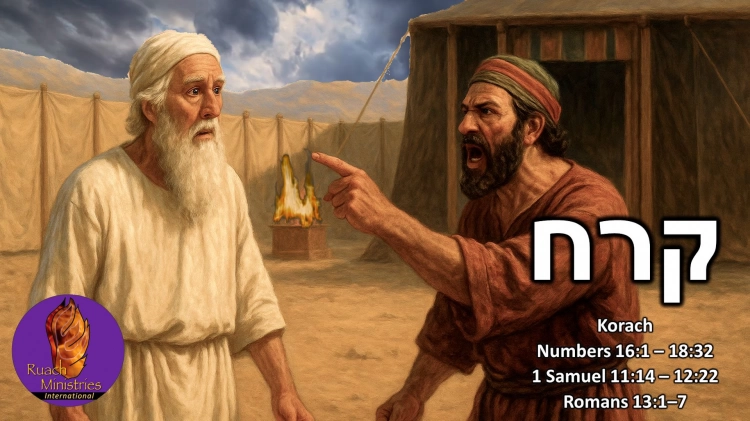
Parsha Korach: The Heart of Biblical Leadership
The Torah portion of Korach (Numbers 16:1-18:32) presents numerous vital truths about genuine spiritual leadership, offering essential biblical teachings that continue to influence prophetic Scripture. Korach, together with his followers, misjudged divine leadership when they questioned Moshe and Aharon about their appointed role since they declared that "all the congregation are holy, every one of them, and Yahweh is among them."
The Servant Leader's Model
True leadership, as Yeshua HaMashiach demonstrated perfectly, emerges from a servant mentality in the heart. Yeshua taught his disciples about eternal leadership principles when he said that those who desire greatness must serve others and those who wish to lead must become servants to all people (Mark 10:43-44). The innovative approach revolutionizes traditional views about authority by substituting selfless devotion for ruling power and personal goals with communal service.
The Roman centurion demonstrated exceptional faith by showing a correct understanding of authority structures. Legitimate leadership operates according to Yahweh's established order because he recognized himself as "a man under authority." Yeshua recognized the centurion's humility by declaring it was the greatest faith he had ever seen in Israel.
Korach's Fatal Misunderstanding
The rebellion of Korach emerged because he let pride and self-interest control his actions. The "lifted up" individuals who stood as "men of renown" failed to understand that their true role involved stewardship instead of ownership. The men chose to pursue divine appointments intended for others rather than fulfilling their designated duties.
Through their complaint of "You take too much upon yourselves" they displayed self-interest instead of prioritizing community welfare. Korach sought both fame and authority while completely misinterpreting that divine authority exists to serve God's people instead of pursuing personal self-aggrandizement. Korach showed the complete opposite behavior to Moshe whom Torah calls "the servant of Adonai" (Deuteronomy 34:5).
Shepherds After Yahweh's Heart
Through Jeremiah Yahweh promises today what He promised in the past: "I will give you shepherds after My own heart who will feed you knowledge and understanding" (Jeremiah 3:15). Faithful shepherds in spiritual leadership roles protect their flock instead of exploiting them. The leaders focus on retrieving lost members while providing assistance to vulnerable individuals and offering care to those who are injured.
The Good Shepherd described by Yeshua serves as the perfect example of this mission since He gives His life to protect the sheep (John 10:11). The authentic leaders show dedication by staying loyal in challenging circumstances while showing true dedication to their responsibilities.
Qualities of Biblical Leadership
Spiritual leadership standards are clearly defined by Torah. Leaders must start by receiving teaching from Yahweh before receiving selection based on their competence and their reverence for Elohim along with their honesty and incorruptibility. Yehoshua received his selection through a process which did not involve personal ambition because "the Spirit" was present in him.
Titus receives guidance from Paul that overseers should be free from scandal and not display arrogance while being self-controlled and holding firm to sound doctrine. The leaders who embody these characteristics can both provide guidance and discipline while upholding Torah's combination of grace and truth.
Application
We stand at the same essential decision point that faced Korach. Do we pursue positions to boost our status or take up positions that require faithful service? Our motivation stems from either seeking recognition or our genuine affection for Yahweh's people.
The prophetic call remains unchanged. Yahweh seeks leaders who exemplify Yeshua's servanthood by imparting wisdom and understanding to His people and living with humility before Elohim. True greatness expresses itself through voluntary acts of service instead of self-promoting behavior.
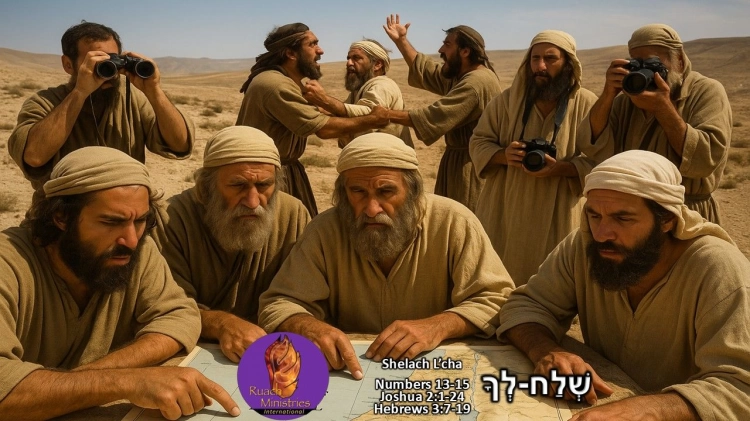
Walking in Faith Toward Yahweh's Promises
Parsha Shelach L'cha_ Send For Yourself
The Torah portion Shelach L'cha presents a lesson about faith, leadership, and the consequences of unbelief. When Yahweh commanded Moses to send twelve leaders to scout the Promised Land, He was testing Israel's willingness to trust His covenant promises despite seemingly impossible circumstances.
The Power of Perspective
The spies witnessed the same reality—a land flowing with milk and honey, inhabited by giants. Yet their interpretation revealed their hearts. Ten leaders focused on obstacles, declaring the inhabitants "stronger than us"—though the Hebrew suggests they questioned whether these enemies were stronger than Yahweh Himself. Only Joshua and Caleb maintained prophetic vision, proclaiming, "Yahweh is with us! Do not fear them."
This narrative illuminates a crucial principle: our perception shapes our reality. When we fix our gaze upon difficulties rather than Elohim's faithfulness, we invite doubt and rebellion. The Israelites' negative report led to an entire night of weeping and murmuring, culminating in their desire to return to Egyptian bondage.
Faith as Active Obedience
Scripture reveals that belief and faith share the same Hebrew root, Amen (Aleph, Mem, Nun)—true faith produces obedience. As Yeshua declared, "With men it is impossible, but not with Elohim. For all things are possible with Elohim!" The question remains: will we submit to Yahweh's vision for our lives, or follow our own understanding?
The Hebrew word tur (to spy out) carries deeper meaning—it can be applied to the heart's tendency to wander. Moses later warns Israel not to follow after their own hearts and eyes, but to remember Yahweh's commandments through the tzitzit's constant reminder. Our hearts naturally deceive us; we need divine guidance to discern truth.
Leadership and Accountability
The text emphasizes severe warnings for spiritual leaders who mislead Elohim's people. Teachers bear stricter judgment, called to uphold Torah rather than diminish its authority. The ten leaders who brought back a slanderous report of the promise of Yahweh serve as a sobering example of corrupted leadership that causes others to stumble.
Wholehearted Devotion
Jeremiah reveals that only one thing provokes Yahweh to act wholeheartedly: restoring His people to covenant relationship (Jeremiah 32:37-41). He promises to give them "one heart and one purpose" to worship Him forever, planting them faithfully in their inheritance. This messianic restoration requires our complete surrender.
Conquering Fear Through Love
Perfect love expels fear because it trusts Yahweh's character completely. When we abide in His love, we gain confidence for every trial. Faith becomes active—not passive wishful thinking, but determined obedience that produces works of righteousness.
The Promise Remains
Though an entire generation perished in the wilderness due to unbelief, Yahweh's covenant promises never fail. We must guard against hardened hearts that fall away from the living Elohim. Daily encouragement in community prevents sin's deception from taking root.
The message of Shelach L'cha transcends ancient history—it speaks prophetically to every believer facing seemingly insurmountable challenges. Will we focus on giants or on our Giant-Slaying Elohim? Will we trust His promises or retreat to familiar bondage?
Through Yeshua ha-Mashiach, we possess everything needed for victorious living. The same Ruach that empowered Joshua and Caleb dwells within us. As we walk in Torah's wisdom and embrace grace, we discover that faith transforms impossibilities into testimonies of Yahweh's faithfulness.
In scorched places, He satisfies our deepest longings. Like a watered garden whose springs never fail, those who trust wholeheartedly in Yahweh find their strength continually renewed for the journey ahead.
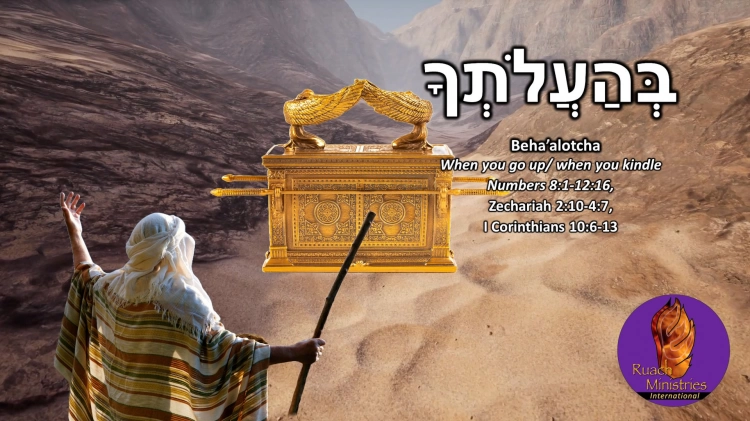
Biblical Evidence for Messianic Resurrection: A Prophetic Tapestry
Parshat Behaalotcha, when you go up
The Hebrew Scriptures contain messianic prophecies that illuminate Yeshua's resurrection throughout biblical history, with Numbers 10:35-36 serving as a remarkable prophetic cornerstone that connects ancient Israel's wilderness journey to our eternal hope.
The Ark's Prophetic Proclamation
When Moses declared "Arise, Yahweh! May Your enemies be scattered!" over the Ark of the Covenant, he spoke words that transcended their immediate historical context. The Hebrew text surrounding these verses contains two inverted "nun" letters—unique textual markers found in the Scripture. These letters on their own mean life, or the quickening of life. These being inverted represent the quickening of life from death, pointing directly toward Mashiach's resurrection power.
The Ark itself carried the tablets containing Yahweh's Torah, symbolizing His eternal covenant with humanity. As it moved forward through the wilderness, leading the people toward the Promised Land, it foreshadowed how Yeshua would lead humanity from death to life. Moses' cry for Yahweh to "arise" became a prophetic declaration of resurrection victory over spiritual enemies—sin, death, and the grave.
When Moses proclaimed "Return, Yahweh of the many thousands of Israel" as the Ark rested, he unknowingly prophesied both our future resurrection to life and Mashiach's promised return. This two-fold proclamation establishes the pattern: first Yeshua's resurrection victory, then our participation in that triumph through faith upon His return.
Ancient Voices of Resurrection Hope
Job's magnificent confession "I know that my Redeemer lives, and at the last He will stand upon the earth" emerges from humanity's deepest suffering, yet declares unwavering confidence in bodily resurrection. The Hebrew word "qum" (stand/rise) used here connects directly to Moses' command for Yahweh to "arise"—both speaking of divine power overcoming death's dominion.
Isaiah's prophetic vision reinforces this hope: "Your dead shall live; their bodies shall rise. You who dwell in the dust, awake and sing for joy!" These words echo through centuries, finding fulfillment when Yeshua emerged from the tomb, proving that YHWH's power extends beyond physical death.
The Psalms repeatedly affirm this messianic expectation. David's declaration "Yahweh will not abandon my soul to Sheol" becomes a direct prophecy of Mashiach's resurrection, cited by the apostles as fulfilled in Yeshua's victory over death.
Typological Patterns Throughout Scripture
Scripture reveals resurrection through powerful typological patterns. Jonah's three-day entombment in the great fish prefigures Yeshua's tomb experience. Isaac's symbolic resurrection from Abraham's altar demonstrates how Elohim provides substitutionary deliverance. Joseph's emergence from the pit and subsequent exaltation mirror the pattern of death, burial, and glorious resurrection.
These patterns establish that resurrection was never an afterthought in Yahweh's plan but the central theme woven throughout Torah, Prophets, and Writings.
Our Participation in Resurrection Life
Paul's teaching in Romans 6 connects our spiritual experience directly to Yeshua's physical resurrection: "If we have become joined together in the likeness of His death, certainly we also will be joined together in His resurrection." The same power that raised Mashiach from the dead becomes available to transform our lives today and guarantee our future bodily resurrection.
Matthew 22:31-32 reveals that Elohim introduced Himself to Moses as "the Elohim of Abraham, Isaac, and Jacob"—present tense, not past—because He is "not the Elohim of the dead, but of the living." This declaration establishes that resurrection hope extends to all who trust in Yahweh's covenant promises.
The Fulfillment of Prophetic Hope
Yeshua's resurrection was not an isolated miracle but the culmination of prophetic expectation spanning millennia. From Moses' proclamation over the Ark to Job's confident confession, from Isaiah's vision to David's psalms, the Hebrew Scriptures consistently point toward resurrection victory.
This prophetic foundation demonstrates that our hope rests not on human optimism but on Yahweh's eternal plan, revealed through His Word and fulfilled through Mashiach's triumph over death—a victory that secures our own resurrection to eternal life.
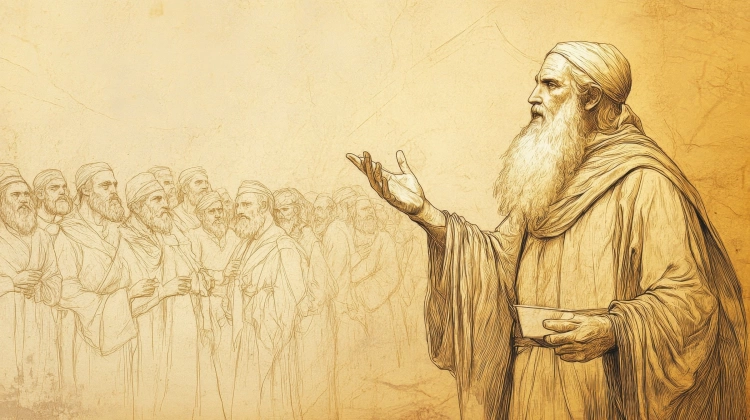
Journey Through Numbers: From Service to Blessing (Naso)
The Book of Numbers reveals the detailed organization of Israelite worship and community life during their wilderness journey. Let's explore the profound connections between chapters 4:21 through 7:89, where we witness the transition from sacred service to divine blessing.
Numbers 4:21-49: The Sacred Trust of Service
This passage carefully documents the census of the Levite clans and their specific responsibilities in transporting the Tabernacle. The Gershonites care for coverings and hangings, the Merarites handle the structural elements, and the Kohathites bear the most holy items. Each clan receives precise instructions about their duties, underscoring the meticulous care required when handling sacred elements.
The emphasis on proper handling of holy items speaks volumes about the relationship between Yahweh and His people. Nothing is left to chance or personal preference—every detail matters in sacred service.
Numbers 5:1-31: The Pursuit of Holiness Within Community
Building upon the previous chapter's focus on sacred order, chapter 5 establishes guidelines for maintaining purity within the camp. It addresses physical impurities, confession and restitution for wrongs, and the controversial test for marital fidelity.
The progression is significant—after establishing proper care for Yahweh's dwelling place, attention turns to the sanctity of the community itself. The message becomes clear: holiness extends beyond sacred objects to encompass relationships between individuals.
Numbers 6:1-21: The Nazirite Vow—Voluntary Devotion
From community holiness, we move to individual dedication through the Nazirite vow. This voluntary commitment to avoid wine, grapes, and cutting hair represents an extraordinary level of consecration to Yahweh. The chapter details both the parameters of the vow and its conclusion with prescribed offerings.
This progression reveals that while baseline holiness is expected of all, Yahweh makes provision for those drawn to deeper levels of devotion. The voluntary nature of this vow demonstrates that love for Elohim inspires commitment beyond mere obligation.
Numbers 6:22-27: The Priestly Blessing—Divine Favor
Perhaps the most beloved passage in this section, the Priestly Blessing represents a pinnacle moment. After establishing proper worship practices, community standards, and pathways for special dedication, we encounter the beautiful words through which Elohim's favor flows to His people:
"May Yahweh bless you and protect you; May Yahweh make His face shine upon you and be gracious to you; May Yahweh lift up His countenance upon you and give you peace."
This blessing stands as the divine response to proper worship and holy living—Yahweh's presence drawn near to a people who honor Him.
Numbers 7:1-89: Generous Offerings and Divine Communion
The final chapter in our passage chronicles the offerings brought by tribal leaders at the Tabernacle dedication. For twelve days, each tribe's representative brings identical gifts, yet Scripture recounts each offering individually—a powerful reminder that Yahweh values each contribution personally, not merely in aggregate.
The section concludes with Moses entering the Tabernacle and hearing Yahweh's voice from between the cherubim—the ultimate fulfillment of proper worship leading to divine communion.
The Theological Progression
Tracing these chapters reveals a beautiful progression:
- Proper handling of sacred elements (4:21-49)
- Maintaining community holiness (5:1-31)
- Provisions for deeper individual dedication (6:1-21)
- The blessing that flows from Yahweh (6:22-27)
- Generous response from the people (7:1-88)
- Intimate communion with Elohim (7:89)
This movement from duty to devotion, from service to blessing, from corporate worship to personal communion mirrors our own spiritual journey. We begin with obedience, move through increasing levels of consecration, and ultimately arrive at intimate relationship with our Creator.
Prophetic Dimensions
These passages foreshadow aspects of Messianic fulfillment. The careful handling of holy things prefigures how Yeshua would fulfill the law perfectly. The cleansing rituals anticipate the greater purification the Mashiach would bring. The Nazirite vow hints at the special consecration of Yeshua, who was "set apart" for divine purpose. The priestly blessing points toward the ultimate blessing found in Mashiach's work.
When Moses heard Yahweh's voice between the cherubim, we glimpse the intimate access all believers would one day have through Yeshua's redemptive work.
Practical Life Applications
- Sacred Responsibility - Like the Levites, we each have been entrusted with gifts to use in service to Yahweh and others. Identify your unique contributions and fulfill them with excellence.
- Community Accountability - Just as Israel maintained camp purity, we must address wrongs, seek reconciliation, and maintain healthy community standards.
- Special Dedication - Consider seasons of special consecration in your life—perhaps through fasting, focused prayer, or abstaining from certain activities to draw closer to Elohim.
- Blessing Others - Incorporate the priestly blessing into your prayer life, speaking words of blessing over family, friends and even strangers.
- Generous Worship - The tribal leaders gave abundantly. How might you exercise similar generosity in supporting sacred work today?
- Seeking Divine Communion - All these practices ultimately lead to hearing Yahweh's voice. Create space for listening prayer in your daily routine.
- Reverence in Service - Approach service to Elohim not as mere duty but with appropriate reverence, recognizing the privilege of handling sacred responsibilities.
- Celebrating Uniqueness - Though the tribal offerings were identical, each received individual attention. Embrace your unique journey with Yahweh.
- Pursuing Holiness - These chapters demonstrate that holiness touches every dimension of life—physical, relational, vocational, and spiritual.
- Finding Identity in Service - The Levites found identity in their specific roles. Discover purpose in your particular calling within the body of believers.
May these insights from Numbers deepen your understanding of sacred service and divine blessing. As we embrace both the responsibilities and privileges of covenant relationship, we experience the fullness of Yahweh's presence—the ultimate blessing for which every heart longs.


Counted at the Skull: A Messianic Revelation from the Wilderness (Numbers) to Golgotha
“Take a census… by the number of their skulls.” – Numbers 1:2
“And He went out, bearing His cross… to the place called Golgotha, which means Place of a Skull.” – John 19:17
There is a profound prophetic thread connecting the census of Israel in the wilderness to the crucifixion of Yeshua at Golgotha. On the surface, these two events may seem unrelated—one a logistical count of fighting men, the other the brutal execution of the Son of Elohim. But seen through messianic eyes, these moments are inseparably linked by the language of atonement, covenant, and being counted among Yahweh’s people.
The Wilderness Census: Each Man Counted by His Skull
In Numbers 1:2, Yahweh commands a census: “Take the sum of all the congregation… by their families… by the number of their names, every male by their skull.” The Hebrew term gulgolet—translated “skull”—is intentionally vivid. It wasn't a faceless tally; it was a personal reckoning. Each man stood to be individually recognized and assigned his place among the tribes of Israel.
But this census wasn’t free. In Exodus 30:12-16, each man had to give a half-shekel of silver as atonement for his soul. This ransom was not a bribe, but a sacred offering—a symbol that each life belonged to Yahweh. It was both a spiritual identification and a prophetic shadow of what was to come.
Golgotha: The Place of the Skull
Centuries later, we find ourselves in John 19:17, as Yeshua is led to Golgotha—“The Place of the Skull.” The Hebrew-Greek wordplay echoes gulgolet, bringing us full circle. At this very hill, Yeshua—our High Priest and perfect Lamb—is lifted up as the atoning sacrifice. No longer is silver required for a man to be counted. The blood of Mashiach becomes the final ransom.
Just as each man once gave a half-shekel to be counted, Yeshua gave everything, so that all—Jew and grafted-in Gentile—might be counted among the redeemed. The census of Numbers pointed toward this moment: the great spiritual census where Yahweh counts those who are in covenant through the atoning work of His Son.
Messianic Fulfillment
This powerful connection highlights a truth often missed: the Torah is not abolished in Yeshua—it is fulfilled and brought to its fullness. The census, the silver atonement, and the camp organization of Israel all foreshadowed a greater reality. Yeshua, by dying at the “place of the skull,” became the once-for-all atonement that the silver half-shekel only represented.
As those who follow Mashiach and walk in Torah, we see that this was never about legalism—it was always about covenant relationship. Redemption is not the end of obedience but the empowerment to walk in it. We are counted to walk, not just to be saved.
Practical Life Applications
- Reflect on Your Standing
Ask yourself: Am I counted among Yahweh’s people through the atonement of Yeshua? This is not about religion—it’s about covenant. - Live with Purpose
Each “skull” was counted for a reason. Your life has a purpose in the body of Mashiach. You are called to take your place, actively. - Honor the Atonement
Just as the half-shekel required intentional giving, so our lives should reflect intentional gratitude for Yeshua’s ultimate offering. - Obey the Torah Joyfully
Walking in obedience isn’t bondage—it’s identity. You’ve been redeemed to live out the instructions of Yahweh. - Proclaim the Message
Golgotha is not merely a place of sorrow. It is a place of victory, where all can now be counted if they receive Yeshua and return to covenant faithfulness.
Final Thoughts
The census in Numbers and the crucifixion at Golgotha are not disjointed events. They are part of a divine tapestry woven by Yahweh to point us to the central truth of Scripture: Redemption is personal, prophetic, and purposeful.
At the skull, Yeshua made a way for every soul to be counted—not with silver, but by His blood. He did not erase Torah; He fulfilled its promise. And now, through Him, we are not only saved—we are numbered among those who will inherit the promises of Yahweh.
To hear more on this, Check out our weekly Torah Teaching on YouTube:
